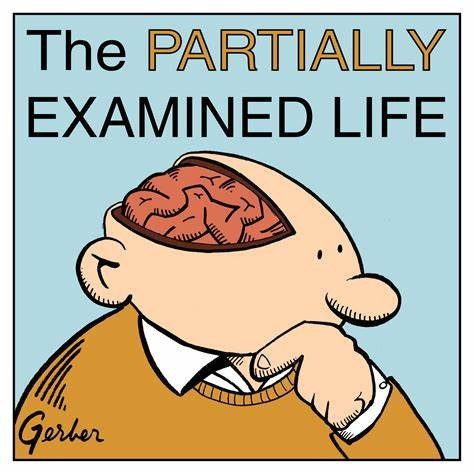The partially examined life philosophy podcast
Subject: Philosophy
Type: Podcast
Hosts: Mark Linsenmayer, Wes Alwan, Seth Paskin and Dylan Casey

How long is it?
There are hundreds of episodes. The podcast also features episodes from other podcasts by its hosts, including Pretty Much Pop, Nakedly Examined Music, Philosophy vs. Improv and (sub) Text.
Is it easy to understand?
The podcast is designed to be accessible to people who haven’t learnt any philosophy.
Who is it for?
It is for anyone who wishes to learn about philosophy in an entertaining way. Please note that the hosts sometimes use swear words.
How recent is it?
The Partially Examined Life Philosophy Podcast released its first episode in 2009 and continues to release episodes to this day.
What to expect from The Partially Examined Life Philosophy Podcast*
Consequentialism
- Bentham and Mill (episode 9)
- Peter Singer (episode 150)
Deontology
- Kant (episode 10)
Virtue ethics
- Aristotle (episodes 5, 147 and 148)
- Plato (episode 40)
Meta-ethics
- Nietzsche (episodes 11, 84 and 178)
- Moral Sense Theory (episode 45)
- Naturalistic ethics (episode 53)
- Deterministic ethics (episode 25)
- Plato in the Euthyphro (episode 46)
- G. E. Moore (episode 58)
- Alasdair MacIntyre (episode 59)
- G. E. M. Anscombe (episode 88)
- Simone de Beauvoir (episode 140)
- Sartre (episode 87)
- A phenomenology of ethics (episode 145)
- Phenomenology of ethics and of the self (episode 146)
Moral Psychology
- The neurobiology of ethics (episode 41)
- Moral developmental patterns (episode 42)
- ‘Situationism’ (episode 176)
- Hannah Arendt (episode 181)
- Augustine (episode 121)
- Eva Brann (episode 120)
Free will
- Galen Strawson (episode 93)
- Sartre (episode 87)
‘How should I approach the world?’
- Plato (episode 1 and 69)
- Stoicism (episode 124, 132 and 201)
- Boethius (episode 158)
- How to be an individual and live deliberately (episode 102 and 103)
- Schopenhauer (episode 94)
- Confucianism (episode 159)
- Taoism (episode 12)
- Ethical ideals in Homeric Greece (episode 185)
- Montaigne (episode 33)
- Heidegger (episode 80)
- Existentialism (episode 4, 63 and 78)
- Epicurus (episode 208)
Political philosophy in history
- Plato (episode 40 and 149)
- Aristotle (episode 60)
- Machiavelli (episode 14)
- The social contract (episodes 3, 23, 35, 36 and 37)
- Spinoza (episode 166)
- Madison and Hamilton (episode 65)
- Political conservatism (episode 151)
- Liberty (episode 183)
- Alexis de Tocqueville (episode 152)
- The progression of history (episode 15)
- Marx (episode 70)
Modern issues
- John Rawls (episode 85)
- Libertarianism (episode 104)
- Communitarianism (episode 97)
- Michael Sandel (episode 98)
- Martha Nussbaum (episode 144)
- A feminist utopian vision (episode 42)
- bell hooks (episode 139)
- Oppression and political commitment (episode 141)
- Realpolitik and race (episode 52)
- White privilege (episode 161)
- Punishment (episode 49)
- Racism (episode 162)
- Contemporary electoral politics (episodes 156 and 157)
- Terrorism (episode 72)
- Orwell and totalitarianism (episode 160)
- Free speech (episode 183)
- Politics and religion (episode 44)
- Fame (episode 64)
- Science advisers and politics (episode 96)
- Anarchism (episodes 256 and 281)
Economics
- The Wealth of Nations (episodes 174 and 177)
- F. A. Hayek and Amartya Sen (episode 123)
- The job system (episodes 83 and 125)
- Guy Debord (episode 170)
Empiricism
- Hume (episode 17)
- Berkeley (episode 89)
- Bertrand Russell (episode 38)
Rationalism
- Plato (episode 18)
- Descartes (episode 2)
- Gödel (episode 95)
Scepticism
- Sextus Empiricus (episode 106)
Pragmatism
- C. S. Pierce and William James (episodes 20 and 22)
- John Dewey (episode 127)
- Contemporary pragmatism (episodes 28, 153, 155 and 196)
Logical Positivism
- Wittgenstein and Carnap (episode 8)
- Carnap’s constructional system (episode 67)
- Quine (episode 66)
Kantianism
- Kant (episode 19)
- Schopenhauer (episode 20)
- Nietzsche (episode 61)
Why epistemology matters
- Ayn Rand (episode 78)
Direct realism
- John Searle (episode 138)
- Hegel (episode 134)
Continental philosophy
- Hegel (episodes 35, 36, 134, 275, 276 and 277)
- Edmund Husserl (episode 31)
- Heidegger (episode 32)
- Sartre (episode 47)
- Merleau-Ponty (episode 48)
- Lacan and Derrida (episodes 51, 74 and 75)
- Analytic philosophy (episodes 52, 55, 56 and 154)
Philosophy of science
- Karl Popper (episode 82)
- Thomas Kuhn (episode 86)
- Leibniz (episode 6)
- Berkeley (episode 89)
- The existence of God (episodes 24 and 43)
- Augustine (episode 122)
- Wittgenstein (episode 7)
- Gottlob Frege (episode 34)
- Carnap (episode 67)
- Quine (episode 66)
- David Chalmers (episode 68)
- Henri Bergson (episode 92)
- Whitehead (episode 110)
- Quantum mechanics (episode 13)
- Presocratic Heraclitus (episode 79)
- Hegel (episode 135)
- Nagarjuna (episode 27)
- Owen Flanagan (episode 53)
- Schopenhauer (episode 114)
- The mind-body problem (episode 21)
- Aristotle (episodes 130, 335, 336, 337 and 338)
- Darwin (episode 168)
- Stuart Umphrey (episode 163)
- Neoplatonism (episode 343)
- Kierkegaard (episode 330)
- Aesthetic sense theory (episode 289)
- Schiller (episodes 318 and 319)
- Arthur Danto (episode 16)
- Nelson Goodman (episode 28)
- Kant (episode 105)
- The sublime (episode 107)
- Schopenhauer (episode 115)
- George Santayana (episode 77)
- Pierre Bourdieu (episode 137)
- Homer (episode 185)
- Theatre (episodes 117, 119 and 188)
- Humour (episode 57)
- Susan Sontag (episode 246)
Philosophy of literature
- Saussure and Levi-Strauss (episode 51)
- Lacan and Derrida (episode 75)
- Authorial intent (episode 189)
- Cormac McCarthy (episode 63)
- Science fiction (episodes 90 and 91)
Philosophical novels
- Herland (episode 42)
- Zen and the Art of Motorcycle Maintenance (episode 50)
- Candide (episode 62)
Philosophical films
- Vertigo (episode 169)
- Blade Runner (episode 175)
- The existence of God (episode 43)
- Intelligent design (episode 167)
- Pascal’s wager (episode 184)
- Maimonides (episode 101)
- Spinoza (episode 165)
- The rationality of faith (episode 129)
- Freidrich Schleiermacher (episode 39)
- Martin Buber (episode 71)
- William James (episode 22)
- New atheism (episode 44)
- Plato (episode 46)
- Buddhism (episodes 27, 53 and 171)
- Taoism (episode 12)
- Religions of the indigenous peoples of America (episode 173)
- Kierkegaard (episode 29)
- Paul Ricoeur (episode 112)
- Jesus’s parables (episode 113)
- The problem of evil (episode 62)
Philosophy of mind
- Introduction (episode 21)
- Aristotle (episode 131)
- Augustine (episode 122)
- AI (episode 108)
Psychology
- William James (episodes 179 and 180)
- Freud (episodes 26 and 116)
- Jung (episode 81)
- Lacan (episode 74)
Philosophy of emotions
- Plato (episodes 100 and 142)
- Love as an art (episode 133)
- Spinoza (episode 25)
Psychology of self
- Hegel (episodes 35 and 36)
- Kierkegaard (episode 29)
- Sartre (episode 47)
- Levinas (episode 146)
- Buber (episode 71)
- Science of the self (episodes 172)
Psychology of education
- Liberal education (episodes 192 and 193)
Philosophy of language
- Logicism (episode 34)
- Semiotics (episode 51)
Analytic philosophy
- Alfred Tarski (episode 194)
- Bertrand Russell (episode 66)
- Plato (episode 143)
- Saul Kripke (episode 126)
- Hilary Putnam (episode 128)
- Rudolf Carnap (episode 191)
Ordinary language philosophy
- Wittgenstein (episodes 55 and 56)
- J. L. Austin (episode 186)
- P. F. Strawson (episode 195)
- Donald Davidson (episode 191)
- Simon Blackburn (episode 196)
Hermeneutics
- Gadamer (episode 111)
- Paul Ricoeur (episode 112)
- Gilles Deleuze (episode 76)
Rhetoric and media critique
- Plato (episode 69)
- Phaedrus (episode 143)
- New critics (episode 189)
Speech and politics
- Totalitarianism (episodes 160 and 181)
- Science advisers (episode 96)
- Adorno (episode 136)
*I have not included every episode in these sections, but I hope it gives you an idea of what to look forward to.
My thoughts…
Here are the episodes I listened to, as well as my thoughts on the topics discussed:
- Episode 1: “The Unexamined Life Is Not Worth Living.”
- Episode 3: Hobbes’s Leviathan: The Social Contract
- Episode 107: Edmund Burke on the Sublime
The skills we build by studying philosophy
I think philosophy has practical value for its students because it teaches them transferable skills. Students learn how to solve problems and think analytically, as well as how to research a topic and write persuasively. In philosophy, there are always countless texts and perspectives on any given topic, which is how philosophy students learn how to determine which arguments are the most credible. In this day and age, there are also innumerable sources of information about non-philosophical topics, from websites, social media and magazines. What this means is that philosophy students, who have improved their critical thinking skills through their subject, are more capable of assessing the reliability of people’s claims. By cultivating their persuasive writing skills in the very many essays they write, philosophy students are also more adept at communicating their thoughts to the world, which is another valuable strength in a world full of contradictory assertions.
The issues with Thomas Hobbes’s notion of the Absolute Sovereign
Hobbes believed that in order for human beings to live together in peace, we should give our obedience to an unaccountable sovereign. He said that the alternative would be everyone at war with each other. However, I would argue that a government with absolute authority is not more effective than a democratic government. Limiting and dividing power means that laws and rights reflect more than just one person’s opinion of what is in society’s best interests, so that better conclusions are reached. According to Hobbes, the most ethical thing we can do is follow the laws, whatever they may be. This is why I value the role of a democratic law-making process, so that we can ensure that the rules we are obliged to follow are reasonable and justified. I therefore strongly disagree with Hobbes’s idea that having an absolute ruler is more important than having a good ruler.
The beautiful vs the sublime
The sublime evokes astonishment and horror, consuming the mind of the observer with the intensity of these emotions. The person is fearful and in awe of an extraordinary sight, usually including nature’s vast, forceful and dynamic qualities, which is what makes the sublime a unique experience. In contrast, the experience of beauty is one which prompts a feeling of love in the observer. Because it does not cause the person to be overcome by the somewhat contradictory feelings of fear and reverence, beauty is easier for the observer to make sense of. I think the sublime is more moving than beauty for this reason. While the beautiful causes pleasure, the sublime is so striking that it is almost beyond our comprehension.
